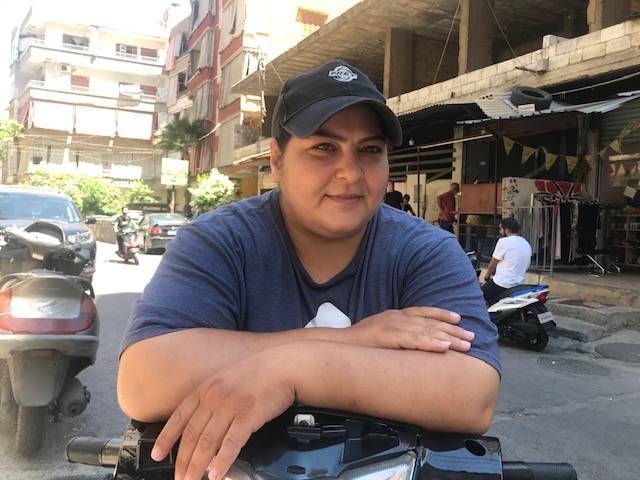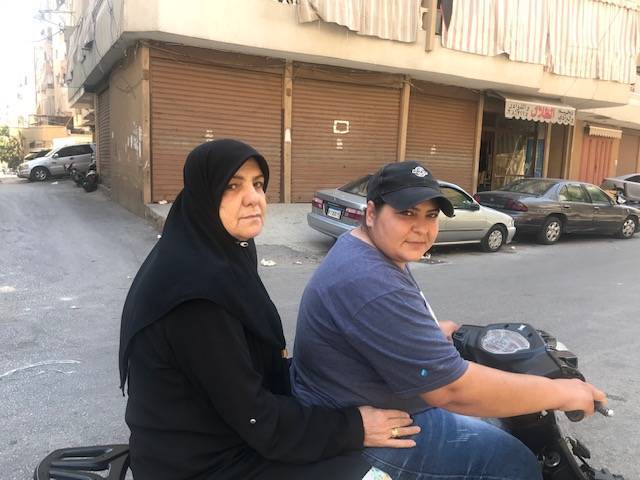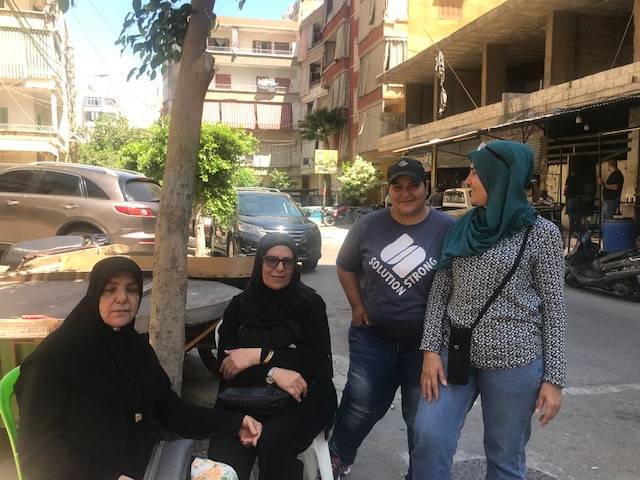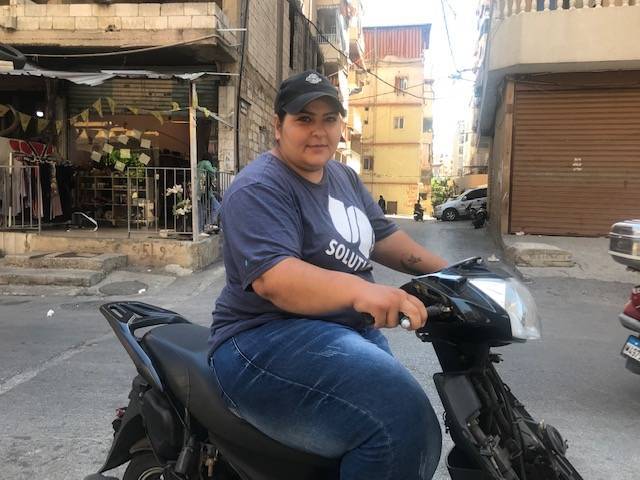
Inas Fakih, 33, has been operating a motorcycle cab for a year and a half in the southern suburbs of Beirut. (Credit: Zeina Antonios/L'Orient-Le Jour)
It’s only 10 AM and Inas Fakih has already picked up several customers on her scooter-taxi. In jeans and a T-shirt, a cap on her head, she roams Beirut’s southern suburbs every day, as well as the city’s neighboring districts and beyond. It has been a year and a half.
Fakih’s clientele, which is exclusively women, appreciate her vehicle as a fast and economic means of transport in a capital that often faces traffic jams. “I have just dropped off a customer in Beirut downtown,” she said during a break between two fares in a street of Burj al-Barajneh. In front of one of the shops, she met with friends and family members who do not hesitate to use her services. “I am proud of her because she has succeeded in setting up her own business. It is a chance nowadays,” said Fayza, Fakih’s aunt and one of her first clients.
At the age of 33, this motorcycle enthusiast has made a name for herself on social media, after her story circulated in the country’s Arabic-speaking media. This exposure earned her many positive comments and encouragement, as well as harassment by some Internet users. “Some criticized my physical appearance, especially my weight. Others think that driving a scooter is for men. I have not responded to any of these intolerant comments. I am satisfied with what I do,” said Fakih, who is fully convinced by her job. Every day, she rides her scooter at 9 a.m., and she often gets off late at night. “Even if someone calls me at 10 p.m. for a fare, I don’t object,” she said.
 Inas Fakih with one of her clients. (Credit: Zeina Antonios/L'Orient-Le Jour)
Inas Fakih with one of her clients. (Credit: Zeina Antonios/L'Orient-Le Jour)
Her clients who often come from conservative backgrounds prefer to take a scooter when a woman is driving. Some are even regulars who use Fakih’s services in their commute to work every morning. “My clients feel safe with a woman behind the wheel. Also, a scooter-taxi is a fast way to get around town and cheaper than a traditional cab,” said Fakih.
The women in the neighborhood trust her. “She is a good driver. When we call her, we know that she will answer every time and that we won’t have to wait alone in the street for a cab to arrive,” said Iman, one of her clients. “I prefer a woman driver. She is patient and answers my requests without complaining,” she added.
 During a break, between two clients, with women of the neighborhood, in Burj al-Barajneh. (Credit: Zeina Antonios/L'Orient-Le Jour)
During a break, between two clients, with women of the neighborhood, in Burj al-Barajneh. (Credit: Zeina Antonios/L'Orient-Le Jour)
A scooter, “liberating”
Fakih’s passion for scooters began in 2006 when her brother agreed to lend her his vehicle. “We were spending the vacations in the village and my brother had bought a scooter. I asked him to let me drive. I started by making short trips, and then, one day, I drove the scooter from the village to Beirut,” she recalled. It was when the economic crisis began to worsen that Fakih decided to use her scooter to earn a living. “Before the crisis, I used to work in a food factory. I was earning LL12,000 or 13,000 a day (a bit under $10, before the local currency’s collapse) working from 7 a.m. to 7 p.m. I couldn’t keep working in such precarious conditions,” Fakih said.
“Today, I make a little more, but I’m not rolling in money,” said the young woman, who hopes to expand her business one day. Her dream? Opening a scooter repair shop. “I learned how to repair scooters by watching my mechanic do it. I think I’ll start this project soon,” she said.
 Inas Fakih, 33, has been operating a motorcycle cab for a year and a half in the southern suburbs of Beirut. (Credit: Zeina Antonios/L'Orient-Le Jour)
Inas Fakih, 33, has been operating a motorcycle cab for a year and a half in the southern suburbs of Beirut. (Credit: Zeina Antonios/L'Orient-Le Jour)
While her scooter-taxi business allowed her to survive, the fluctuating gas prices have complicated her daily life. “Gasoline is one of my biggest problems right now. Before the crisis, I used to pay a maximum of LL10,000 to fill up the tank every three or four days. Now I pay LL150 to 200,000 every day,” she said. Despite the high inflation rate, Fakih’s fees are affordable, in a bid to meet the demand of a clientele that does not have much money. She charges LL25,000 (less than a dollar on the parallel market) for a fare within the southern suburbs and LL50,000 (a dollar and a half) or more for a fare outside this area.
Since she started offering her taxi services, Fakih has been a muse to many people in the southern suburbs. Many local women asked her to teach them how to drive. “Driving a motorcycle or scooter is somehow liberating, and is an efficient means of transportation,” said Fakih. “As far as I’m concerned, my scooter is my baby. I don’t deny it anything,” she added as she smiled.
This article was originally published in L'Orient-Le Jour. Translation by Joelle El Khoury.
